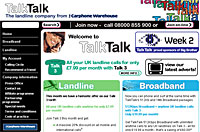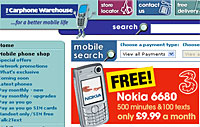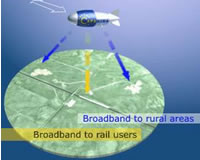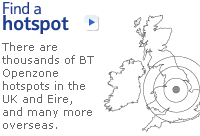 In a cornucopia of convergence, BT has announced their intention to use the Microsoft TV Internet Protocol Television (IPTV) Edition software platform to deliver TV over broadband in the UK. Internally within BT, the project is referred to as Project Nevis.
In a cornucopia of convergence, BT has announced their intention to use the Microsoft TV Internet Protocol Television (IPTV) Edition software platform to deliver TV over broadband in the UK. Internally within BT, the project is referred to as Project Nevis.
The Microsoft TV IPTV Edition software platform lets broadband network operators whizz high-quality video content and services down the wire to their customers using existing and next-gen broadband networks.
The platform delivers cost-effective and security-enhanced delivery of a whole gamut of pay-TV service offerings, including standard- and high-definition channels, on-demand programming, digital video recording, and interactive program guides.
There are extra consumer-pleasing gizmos in the package too, with features like instant channel-changing and picture-in-picture functionality using multiple video streams.
![]() Unlike most consumer pay-TV delivery systems, the Microsoft TV platform allows network operators to integrate the delivery of pay-TV services with other networked broadband services in the home such as PCs, telephones, game consoles, mobile devices and other gadgets.
Unlike most consumer pay-TV delivery systems, the Microsoft TV platform allows network operators to integrate the delivery of pay-TV services with other networked broadband services in the home such as PCs, telephones, game consoles, mobile devices and other gadgets.
Gavin Patterson, Group Managing Director of BT Retail slipped on his buzzword moccasins and danced a soft shoe shuffle to his Big Vision:
“BT and Microsoft share a common vision for converged entertainment in the home. TV over broadband services will play an important role in BT’s triple-play offering for consumers. Our approach of over-the-air broadcast and broadband-delivered video-on-demand, interactivity and enhanced support is the perfect solution and complements existing TV propositions already in the UK market. The combination of Microsoft’s best-in-class technology with BT’s 21st-century network will result in an incredibly exciting set of next-generation entertainment and communication services available to consumers across the UK.”
 As the sound of mutual backslapping threatened to reach ASBO-generating levels, Moshe Lichtman, corporate VP of the Microsoft TV division gushed:
As the sound of mutual backslapping threatened to reach ASBO-generating levels, Moshe Lichtman, corporate VP of the Microsoft TV division gushed:
“BT is a great example of one of the world’s leading network operators choosing Microsoft TV as the software platform for its digital TV and converged entertainment services.”
“We are very pleased to be working with such a well-respected and innovative operator as BT. Microsoft TV IPTV Edition will enable a full suite of integrated entertainment and communication services that will set the bar for what consumers will expect,” he added.
BT plan to start trials of the TV over broadband service in early 2006, with a commercial service expected to start in the summer of 2006.
 BT has unveiled a smarty-pants phone designed to integrate landline and mobile phone technologies.
BT has unveiled a smarty-pants phone designed to integrate landline and mobile phone technologies.  BT Fusion is part of the company’s strategy to lure back customers wooed by mobile telephonic temptresses touting cheap calls.
BT Fusion is part of the company’s strategy to lure back customers wooed by mobile telephonic temptresses touting cheap calls.  “The future will be convergence”, insisted Livingstone. “This is going to be a market that grows fantastically over time even though it might take a while to get going. We still expect many millions of converged handsets by the end of the decade.”
“The future will be convergence”, insisted Livingstone. “This is going to be a market that grows fantastically over time even though it might take a while to get going. We still expect many millions of converged handsets by the end of the decade.”  Calls to landlines originating in the home will be ratcheted up at BT’s regular rate of 5.5 p (10 cents, €0.08) for up to an hour.
Calls to landlines originating in the home will be ratcheted up at BT’s regular rate of 5.5 p (10 cents, €0.08) for up to an hour.  There’s a big battle going on for your landline, with the Carphone Warehouse limbering up to get in some telling punches into BT’s sector dominance.
There’s a big battle going on for your landline, with the Carphone Warehouse limbering up to get in some telling punches into BT’s sector dominance.  Chief exec Charles Dunstone was ready with a quote: “We are now well on the way to developing a broad-based telecoms group, providing mobile and fixed line services to individuals and businesses across ten countries.”
Chief exec Charles Dunstone was ready with a quote: “We are now well on the way to developing a broad-based telecoms group, providing mobile and fixed line services to individuals and businesses across ten countries.”  Crucially, revenues from telecoms services were up 45% to £804 million (~US$1,462m ~€1,190m), with operating profit flying up 50% to £22.5 million (~US$41m ~€33m).
Crucially, revenues from telecoms services were up 45% to £804 million (~US$1,462m ~€1,190m), with operating profit flying up 50% to £22.5 million (~US$41m ~€33m).  Research from BT shows that the number of users connecting to the Internet via broadband has overtaken dial-up subscriptions for the first time, with 7.4 million broadband customers (including cable) now online.
Research from BT shows that the number of users connecting to the Internet via broadband has overtaken dial-up subscriptions for the first time, with 7.4 million broadband customers (including cable) now online.  High speed connections are also good news to those selling goods and services online, with an explosive growth in the consumer market for buying media online, such as films, music and television.
High speed connections are also good news to those selling goods and services online, with an explosive growth in the consumer market for buying media online, such as films, music and television.  Two million cable customers now enjoy broadband connectivity through NTL and Telewest.
Two million cable customers now enjoy broadband connectivity through NTL and Telewest.  AOL today trumpeted its intention to muscle into the UK phone business with the launch of a home service offering unlimited calls for an introductory flat rate of £7.99 (~US$14, ~€11) per month.
AOL today trumpeted its intention to muscle into the UK phone business with the launch of a home service offering unlimited calls for an introductory flat rate of £7.99 (~US$14, ~€11) per month.  Johnny-come-lately subscribers signing up after 30 June 2005 will pay this standard monthly subscription fee.
Johnny-come-lately subscribers signing up after 30 June 2005 will pay this standard monthly subscription fee.  Broadband is taking off everywhere, speeds are increasing and everybody’s happy. Well almost. Broadband isn’t available to all, especially those in more rural areas.
Broadband is taking off everywhere, speeds are increasing and everybody’s happy. Well almost. Broadband isn’t available to all, especially those in more rural areas.  Other approaches to HAP involve lightweight aircraft, such as the European-funded Capanina project.
Other approaches to HAP involve lightweight aircraft, such as the European-funded Capanina project.  BT Rich Media has cuddled up to Sportfive, a French sports marketing group, and announced a partnership to make 2006 Football World Cup qualifying and friendly games available to fans streamed over broadband on the Internet.
BT Rich Media has cuddled up to Sportfive, a French sports marketing group, and announced a partnership to make 2006 Football World Cup qualifying and friendly games available to fans streamed over broadband on the Internet.  Football bonkers viewers will be able to choose between 250Kbps or 500Kbps quality streams for approximately £7 (~US$13 ~€10), or alternatively download the entire match to keep forever for around £5 (~US$9.50 ~€7). As a long suffering Wales fan, I have to admit that there’s several games which I never wish to see again!
Football bonkers viewers will be able to choose between 250Kbps or 500Kbps quality streams for approximately £7 (~US$13 ~€10), or alternatively download the entire match to keep forever for around £5 (~US$9.50 ~€7). As a long suffering Wales fan, I have to admit that there’s several games which I never wish to see again!  The games will be served up on http://www.qualifiers2006.com and promoted to over 10 million users via a range of affiliate sites such as soccernet.com,.teamtalk.com, sportinglife.com and rivals.net .
The games will be served up on http://www.qualifiers2006.com and promoted to over 10 million users via a range of affiliate sites such as soccernet.com,.teamtalk.com, sportinglife.com and rivals.net .  AbbiTalk, a West Sussex-based provider of Voice Over IP (VoIP) telephony services, is talking tough about its cut-rate broadband call packages, that offer customers extra telephone lines with discount local and UK call charges and no line rental.
AbbiTalk, a West Sussex-based provider of Voice Over IP (VoIP) telephony services, is talking tough about its cut-rate broadband call packages, that offer customers extra telephone lines with discount local and UK call charges and no line rental.  Prices start at £149 for “AbbiTalkBasicOne”, which provides one extra phone line, a unique number with Pre Pay phone account, an adaptor and a DECT digital cordless phone with digital answering machine.
Prices start at £149 for “AbbiTalkBasicOne”, which provides one extra phone line, a unique number with Pre Pay phone account, an adaptor and a DECT digital cordless phone with digital answering machine.  No line rental is charged and there’s no need to use a computer to make the calls as these are accomplished through the standard cordless handsets.
No line rental is charged and there’s no need to use a computer to make the calls as these are accomplished through the standard cordless handsets.  Unlike several telecoms companies in the US who are hell bent on blocking free Wi-Fi hotspots, BT has stated that it has “no problems” with the concept.
Unlike several telecoms companies in the US who are hell bent on blocking free Wi-Fi hotspots, BT has stated that it has “no problems” with the concept.  The network covers the length of Upper Street – one of the busiest streets in Islington – with the Council donating PCs to some local businesses as part of its push to boost economic activity in the area and to encourage local residents onto the Internet.
The network covers the length of Upper Street – one of the busiest streets in Islington – with the Council donating PCs to some local businesses as part of its push to boost economic activity in the area and to encourage local residents onto the Internet.  Clark does not envisage US-style legal wrangling in the future for the UK and expressed confidence that if more people use Wi-Fi it will drive demand for BT’s services.
Clark does not envisage US-style legal wrangling in the future for the UK and expressed confidence that if more people use Wi-Fi it will drive demand for BT’s services.  UK Online is hoping to bring broadband to the masses by smashing the price point for “entry-level” home broadband down to a wallet-untroubling £10 a month.
UK Online is hoping to bring broadband to the masses by smashing the price point for “entry-level” home broadband down to a wallet-untroubling £10 a month.  Surfers not used to this level of generosity may be wondering where the catch is, but we haven’t found it yet: we wrote to UK Online and they confirmed that both the Broadband 500 and Broadband 2000 are unlimited services with the Broadband 8000 offering an enormous 500GB monthly download allowance.
Surfers not used to this level of generosity may be wondering where the catch is, but we haven’t found it yet: we wrote to UK Online and they confirmed that both the Broadband 500 and Broadband 2000 are unlimited services with the Broadband 8000 offering an enormous 500GB monthly download allowance.